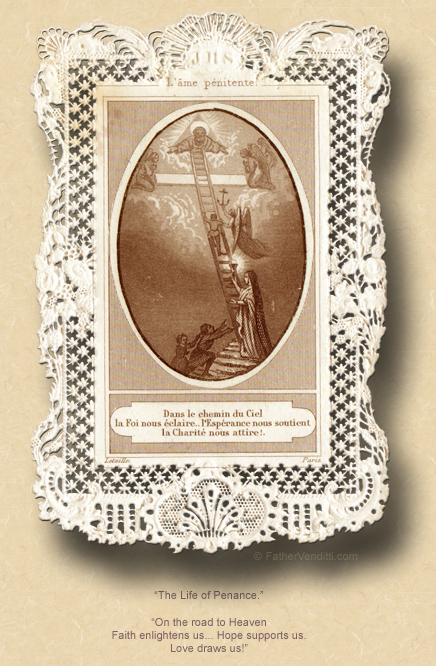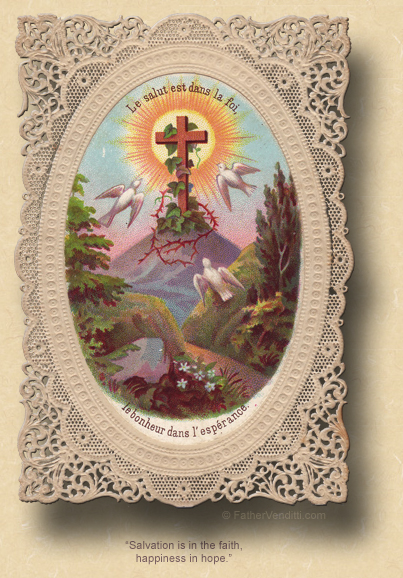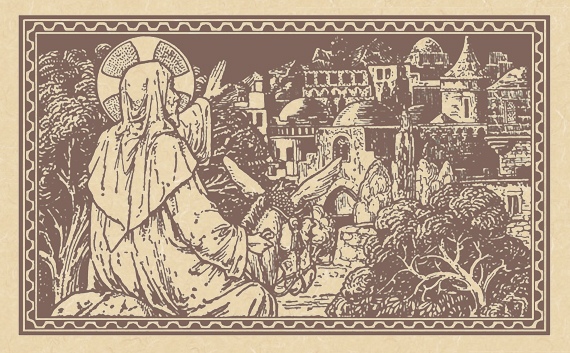Our Lord is Not Doctor Phil.
The Thirteenth Sunday of Ordinary Time.
Lessons from the tertiary dominica, according to the ordinary form of the Roman Rite:
• I Kings 19: 16, 19-21.
• Psalm 16 1-2, 5, 7-11.
• Galatians 5: 1, 13-18.
• Luke 9: 51-62.
The Sixth Sunday after Pentecost.
Lessons from the dominica, according to the extraordinary form of the Roman Rite:
• Romans 6: 3-11.
• Psalm 89: 31, 1.
• Mark 8: 1-9.
The Sixth Sunday after Pentecost; the Sixth Sunday of the Apostles Fast; the Feast of Our Venerable Father David of Thessalonica; the Remembrance of the Blessed Martyrs Nicholas Konrad, Priest, & Vladimir Pryjma, Cantor; and, the Remembrance of the Blessed Martyr Andrew Ishchak, Priest.
First & third lessons from the pentecostarion, second & fourth from the menaion, according to the Ruthenian recension of the Byzantine Rite:*
• Romans 12: 6-14.
• Galatians 5: 22—6: 2.
• Matthew 9: 1-8.
• Luke 12: 32-40.
FatherVenditti.com
|
 8:26 AM 6/26/2016 — When I first looked at the Scripture lessons for today's Mass, I was a little put off about what to offer you about them because they are so mystical in nature, though they may not seem that way at first sight. I was more in the mood for another one of our Lord's parables which, while certainly symbolic, usually have some simple, down-to-earth lesson in them. There might be such in today's Gospel lesson, but that's not what leaps out from the page; Saint Luke's opening line sets the tone, and the Roman Missal actually does a masterful job translating it: “When the days for Jesus' being taken up were fulfilled, he resolutely determined to journey to Jerusalem…” (9: 51 RM3). Msgr. Knox's translation might even be better, as it clearly transmits the import of the moment: “And now the time was drawing near for his taking away from the earth, and he turned his eyes steadfastly towards the way that led to Jerusalem” (9: 51 Knox). 8:26 AM 6/26/2016 — When I first looked at the Scripture lessons for today's Mass, I was a little put off about what to offer you about them because they are so mystical in nature, though they may not seem that way at first sight. I was more in the mood for another one of our Lord's parables which, while certainly symbolic, usually have some simple, down-to-earth lesson in them. There might be such in today's Gospel lesson, but that's not what leaps out from the page; Saint Luke's opening line sets the tone, and the Roman Missal actually does a masterful job translating it: “When the days for Jesus' being taken up were fulfilled, he resolutely determined to journey to Jerusalem…” (9: 51 RM3). Msgr. Knox's translation might even be better, as it clearly transmits the import of the moment: “And now the time was drawing near for his taking away from the earth, and he turned his eyes steadfastly towards the way that led to Jerusalem” (9: 51 Knox).
You understand what Saint Luke is saying to us, I trust: Jesus and His friends are embarking on their last long trip to Jerusalem. He's been there many times, but this will be the last trip because after this is Calvary. And Jesus knows it! What the Apostles knew is pure speculation, but the fact that our Lord knew is actually buried in Luke's cryptic choice of words: He was “resolutely determined” to go, or, as Msgr. Knox so poetically puts it, “…and he turned his eyes steadfastly toward the way that led to Jerusalem.” It's not explicitly said, of course—very few things in Luke's Gospel are—but why else make the remark of how determined our Lord was? The disciples, after all, had tried to dissuade Him from going, suspecting all along what would happen there. So did a lot of other people, who begin, at this point, to start to avoid our Lord for that reason; and, that, too, is alluded to in the passage:
And he sent messengers before him, who came into a Samaritan village, to make all in readiness. But the Samaritans refused to receive him, because his journey was in the direction of Jerusalem (vs. 52-53 Knox).
But, even without the knowledge that we have in retrospect—that our Blessed Lord is God and His death on the Cross is preordained and even intended—there is the account of these three individuals who are not put off by what seems to be our Lord's poor decision to walk right into the lion's den, so to speak, but who are, in fact, attracted to the example of sacrifice; and, it's here, in these three men, that we find ourselves in this episode. After all, we wouldn't be here right now if we didn't have some desire to follow our Lord; but, like the three men in the lesson, we're not all at the same stage of readiness.
The first one seems to be the quintessential disciple: he comes right up to our Lord, unsolicited, and says straight out, “I will follow you wherever you go” (v. 57 RM3). We've seen this before, haven't we? Think back to the Rich Young Man who approaches our Lord (cf. Mark 10: 17-27; &, Matt. 19: 16-22) asking to be part of His company, only the Rich Young Man doesn't know what's ahead, as demonstrated by the fact that he's unwilling to part with his material possessions; but, this man is different: reading Luke between the lines, it seems that, while he may not know the particulars of what awaits our Lord in Jerusalem, he knows it won't be pleasant. Our Lord's mysterious line to him, about foxes having their lairs and birds their nests but the Son of Man having no where to lay His head, is nothing more than our Lord just making sure he understands what he'll be sacrificing.  And, as usual, we don't know what he ultimately decides, as often happens in Saint Luke's Gospel: various people cross our Lord's path, He has a brief encounter with them that makes some point or occasions some lesson by our Lord, then they disappear from the narrative, vanishing into thin air, it seems, because, as far as Luke is concerned, the point is made and they've served their purpose. Luke never allows us to get distracted by some human interest story from the spiritual and theological point that's being made. The Rich Young Man, the rabbi who wants to justify himself, the woman at the well in Samaria, the man with the son possessed by demons, the centurion with the dying servant, the one leper who comes back to give thanks for his cure: we never hear from them again; they each have their moment with our Lord, then they're gone. Luke denies us the “closure” of knowing what ultimately happens to them because they are not what all these different passages are about. Like the man in the Gospel lesson for today: Saint Luke cryptically alludes that he at least suspects that, upon arriving in Jerusalem, our Lord will be involved in some difficultly of some sort, and he wants to follow anyway. Our Lord's response, highlighting the nature and mystery of the Cross for anyone who chooses to follow the way of Jesus, is more for our benefit than for this man's; and, the Evangelist doesn't bother to tell us what this man decides or what he does because it isn't important. The Gospel is not a novel: it isn't important that all the sub-plots are resolved and all the characters are accounted for. And, as usual, we don't know what he ultimately decides, as often happens in Saint Luke's Gospel: various people cross our Lord's path, He has a brief encounter with them that makes some point or occasions some lesson by our Lord, then they disappear from the narrative, vanishing into thin air, it seems, because, as far as Luke is concerned, the point is made and they've served their purpose. Luke never allows us to get distracted by some human interest story from the spiritual and theological point that's being made. The Rich Young Man, the rabbi who wants to justify himself, the woman at the well in Samaria, the man with the son possessed by demons, the centurion with the dying servant, the one leper who comes back to give thanks for his cure: we never hear from them again; they each have their moment with our Lord, then they're gone. Luke denies us the “closure” of knowing what ultimately happens to them because they are not what all these different passages are about. Like the man in the Gospel lesson for today: Saint Luke cryptically alludes that he at least suspects that, upon arriving in Jerusalem, our Lord will be involved in some difficultly of some sort, and he wants to follow anyway. Our Lord's response, highlighting the nature and mystery of the Cross for anyone who chooses to follow the way of Jesus, is more for our benefit than for this man's; and, the Evangelist doesn't bother to tell us what this man decides or what he does because it isn't important. The Gospel is not a novel: it isn't important that all the sub-plots are resolved and all the characters are accounted for.
That being said, today's lesson does not end without two more mysterious encounters, two more nameless people our Lord just happens to bump into before they, too, vanish into thin air; but, they are very different from the first fellow. They seem to be anxious to walk along with our Lord as well, but not without conditions; and, the conditions they have seem to us perfectly reasonable: one wants nothing more than to go home and say goodbye first to his family; the other one has a dead father lying at home. We want to ask our Lord what He actually wants here. Does he really want this man to leave his father decomposing on his death bed while he obeys the Lord's command to proclaim the kingdom of God? But notice that Luke, again, doesn't tell us what either of them decides to do. Our Lord says what he says to each of them, and—poof—they're gone. What they do doesn't matter; it's what we do that matters. And it's to that end that our Lord speaks to us the last line of today's Gospel lesson: “No one who sets a hand to the plow and looks to what was left behind is fit for the kingdom of God” (v. 62 RM3).
Each of us could tell the story of our own encounters with our Blessed Lord. And each of us is often tempted to view that story like it was a novel or a television drama, with all the characters accounted for and all the plot lines neatly tied up and resolved. The problem is that the interior life doesn't work that way: the disease of sentimentality, the constant looking backward into the fog of regret: what might have been, what could have been, what should have been. None of it matters. The woman who comes into confession full of regret that she may have treated her husband uncharitably in the last difficult days of his life, or the parent full of regret that the falling away of his children from the faith might have been avoided had he done something different or said something different. An elderly priest, now deceased, once came to me, full of remorse over something he had done some thirty or forty years before, which would have caused a great scandal to the Church had it ever been known; and, I asked him if he had confessed it before, and he said, “Oh, yes, many years ago.” So I asked him if it was likely that it would ever become known, and he said, “Oh, no, Father, everyone involved has been dead for some time.” And I said to him, “Then get back to your parish and get on with it!” What do you expect from our Lord? Closure? Our Lord is not Doctor Phil. He does not offer us closure. He offers us absolution. He offers us Grace. Whatever else we think we need we obtain through cultivating the virtues of Faith and Hope.
In today's apostolic lesson, Saint Paul warns the Galatians about allowing themselves to become slaves to the desires of the flesh, but we can give to his opening line a different meaning. In the interior life, no chains are heavier to bear than the chains of the past, and the Apostle's words are offered to us to cut through those chains like a hot knife through butter: “Stand fast, and do not let yourselves be caught again in the yoke of slavery” (Gal. 5: 1 Knox).

* The lessons from the menaion are for the Feast of the Venerable Father David. The "remembrances" are of martyrs not formally canonized, but which appear in the typicon of the Ruthenian recension, and no liturgical texts exist for them.
|

